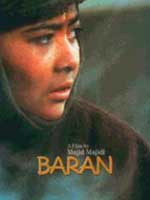
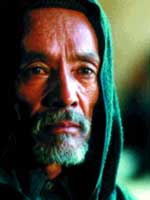 BARAN
BARAN
 BARAN
BARAN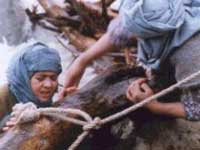
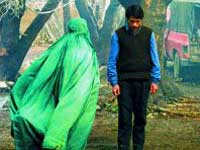
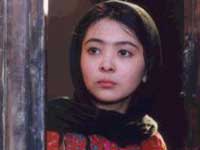
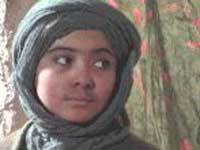
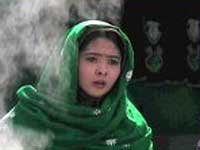

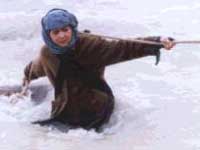
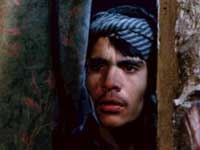
More photos at: http://www.yazda11.com/majidi/baran/gallery/photos_F.html
---------------------------------------------
Director: Majid Majidi
Starring: Zahra Bahrami (as Rahmat/Baran), Hossein Abedini (Lateef), Mohammad
Amir Naji (Memar), Abbas Rahimi (Soltan)
Language: Farsi and Dari (with subtitles)
Writer: Majid Majidi
Cinematographer: Hafez Ahmadi
Music: Ahmad Pezhman
Running time 94 minutes
Country Iran
Year 2001
Rated PG
Despite the "axis of evil" message from George Dubya's West Wing, Iran has taken in well over a million refugees from Afghanistan. Although not officially assimilated into that society, they have become the mainstay of a black economy, exploited and appreciated in equal measure. Majid Majidi's follow up to the internationally acclaimed The Colour Of Paradise is an emotionally strong and politically potent piece of cinema. The location is a half completed building site, where the majority of the workforce consists of illegal Afghanis. When one of them has an accident, there is no compensation, but the next day a fellow worker brings the injured man's young son, Rahmat, to take his place. Baran means rain and concerns Lateef, an Iranian teenager, whose cushy job of making tea and preparing a midday meal for the men, is taken by Rahmat, because he is not strong enough to carry the sacks of concrete. At first, he bullies the younger boy, who remains sad and submissive, but, later, when he discovers more about him, his attitude changes and he becomes his protector. The film is astonishingly beautiful in its pristine silver light, with snow on the ground and a weak sun low over the city. The workers are well trained to disappear when the government men turn up for inspection. Although the site manager has a harsh tongue, his sympathy for the refugees is genuine. Majidi's mastery of his craft enables such a simple story to capture your heart. Review by The Wolf, iofilm, 4 stars |
||||
The crisp storytelling and romantic sentiments of Iranian writer-director Majid Mjidi shine through in this tale of love between an Iranian and an Afghan immigrant in Tehran At a building site in suburban Tehran, Iranian teenager Lateef (Abedini) runs errands for foreman Memar (Naji), who illegally employs Afghani refugees prepared to work for meagre wages. Lateef is furious that his tea-making job is given to a young Afghan, Rahmat (Bahrami), and that he now has to hump around sacks of cement instead. His anger is replaced by infatuation, however, when he discovers that Rahmat is actually Baran, a beautiful girl, in disguise. A visit from government inspectors ensures that all the immigrant labourers are laid off and have to return to their villages, but an undaunted Lateef is determined to track Baran down... Baran's opening captions provide the film's wider social, political and economic context, informing the viewer that some 1.5 refugees have fled Afghanistan for Iran in recent decades (although this number is doubtless considerably larger since the 01-02 war). Yet while portraying the plight of these exiles in a foreign land, Majid Majidi, one of Iran's most populist directors, also presents us with a touching love story. It's conveyed not through dialogue, but via the facial expressions and gestures of its non-professional actors. The transformation of Lateef borders on the miraculous, with his adoration of Baran leading to acts of self-sacrifice that jeapordize his own future in Iran. Whereas previous features by Majidi such as the Children Of Heaven (1997) and The Colour Of Paradise (1999) luxuriated in bright colours, Baran is etched in more subdued tones. Mohammad Davudi's cinematography is assured and lyrical nevertheless, most notably in the film's poignant closing shots. Verdict |
||||
|
Raw emotion ... Baran. Here's a simple way to revitalise the Australian film industry: ban depictions of women, except when fully veiled. There should be no touching between couples, either, and no visible female hair. A censorship system which rates films as A, B or C would also help, where only A films can be advertised on government-run television and booked into the best theatres. These have been the conditions under which Iranian filmmakers have operated for most of the past 24 years. During that time, their films have become world-famous. Iran is not just the most important developing country in world cinema; Iranian film is arguably the most important new cinema movement from anywhere in the past dozen or so years. In 1997, four Iranian films won the top awards at Cannes, Locarno, Montreal and Tokyo film festivals; in 2000, another four won the best first film awards at Cannes, Venice, Montreal, Thessaloniki and Chicago. The names of Abbas Kiarostami and Mohsen Makhmalbaf are hallowed in festival circles (Kiarostami is a guest at the Melbourne Film Fest next month), but try asking for their films at even a good video store. Majid Majidi's films are an exception here, probably because he usually makes crowd-pleasers. Children of Happiness, about two siblings sharing one pair of shoes, was sentimental as anything, as was The Color of Paradise. He sometimes makes something tougher, like The Father - about a boy waging war on his army stepfather - or this one, a flinty film about young love set on a building site. The building, about four storeys high, is on the outskirts of Tehran, its sides open to the howling winds. The workers are mostly Afghan refugees, who have been in Iran for more than 20 years (since the Soviet Union invaded Afghanistan). They are not allowed to work, so they hide whenever the government inspectors appear. Majidi does a lot with this setting: there are big fire drums blazing on each floor, workers scurrying about covered in cement dust, smoke from boiling cauldrons of pitch. It looks like a cross-section of hell, only colder. At the bottom is Lateef (Hossein Abedini), a boy of about 16 who makes the tea and cooks for the workers. He's a tad slow, but cheeky and pugnacious, and he hordes what little money the foreman, Memar (Mohammad Amir Naji), gives him. His world changes when one of the Afghans breaks his leg. The injured man's teenage son turns up next day to work, but we can see that the boy, calling himself Rahmat (Zahra Bahrami), isn't what he appears to be. Lateef is initially hostile, but his attitude softens when he discovers Rahmat's secret. The film has long, beautifully paced sections with no dialogue, so that it feels at times like a silent movie. Combined with the harsh weather and setting, it becomes very elemental, with emotions pared back to match. That's perhaps why Lateef is a bit simple - it makes it easier to believe his single-mindedness when he decides to help Rahmat. Iran has the largest refugee population in the world - about 3 million people. At least 2.3 million of these are Afghans, most of whom live in the community. The actor playing Rahmat did grow up in a refugee camp near Mashad, but the family used the money they got from the film to buy a house. Review by Paul Byrnes, SMH, June 26 2003 | ||||
Here are some facts about Iran, one of the countries listed by George Bush as part of 'the axis of evil.' It is a country of 65 million people, ethnically almost as diverse as the USA or the UK. Sixty-five per cent of these people are under the age of 25. It has the world’s largest refugee population: about three million people, half of whom came from Afghanistan. They began arriving at the time of the Soviet Invasion of their country. The recent American-led invasion of Afghanistan has swollen the refugee population. Iran is a theocracy, with strict censorship controls on cinema production and exhibition. In the last two decades one of the most important new cinema movements in the world has emerged: a movement producing films distinctly ethical and humanist. The movement began well before the Iranian revolution of 1978. It began in the sixties, in the time of the American sponsored Shah. But Iranian film has flourished since the Revolution: often with difficulty, but with filmmakers trained at KACUN (the Centre for the Intellectual Development of Children and Young Adults). One of the most revered of those filmmakers, Abbas Kiarastami, will be in Australia next week as a guest at the Melbourne International Film festival. His films are austere, playful, and oblique. They raise questions for viewers, who must work to interpret the stories he is telling. In the past five or six years Iranian films have begun to appear in Australian art houses. The film Baran, by Majid Majidi - whose last film, The Children of Heaven, was about a boy who loses his sister's only pair of shoes - was also released here. Baran is set on a construction site in Tehran, where Afghan refugees without work permits toil in the cold and the clouds of cement dust. A sixteen-year-old Iranian boy, Lateef, is the runner; paid to shop, bring tea and prepare food for the workers. When one of the refugees breaks his leg, young Rahmat, another refugee, is brought in to replace him. Rahmat isn’t strong enough for the labouring work, so the site boss gives Rahmat the runner's job and puts Lateef to work labouring. And Lateef is furious. Spying on the new kid, he makes a discovery. Rahmat is actually a girl, Baran. In the country where onscreen kissing is illegal, and women must cover their hair and observe a hundred restrictions, this discovery is startling. Majidi handles this scene of discovery with great delicacy and restraint. Lateef, who is a little simple, a bit of a clown; peers around a doorway, past a curtain, and we catch a glimpse only, reflected in a mirror, of the girl brushing out her hair before covering her head with scarf and cap. He says nothing. He falls in love, and seeks to become Baran’s protector. When she leaves the building site with her injured uncle, he continues to watch her from afar, to offer help where he can without her ever knowing. He, and we, gradually discover more of the dilemmas of the Afghan refugees. Baran is a wonderful love story. It is a love which is built on glimpses, and the exchange of small courtesies. It’s a film which also raises questions about love as caritas, a fundamental caring which does not seek reward. Majidi makes beautiful cinema of this motif of the watcher. With Lateef, we observe Baran around doorways, through the tiny unframed windows of the building site, a glimpse of a figure behind a door opened by another. Majidi makes the opening and slow closing of a door more erotically suspenseful than most western filmmakers achieve with their staging of naked sexuality. This is a small gem of a film. Baran is screening now in Brisbane, Sydney and Melbourne with other states to follow later this year. Reviewed by Julie Rigg, ABC |
||||
It is ironic that George W. Bush called Iran part of the "Axis of Evil", yet this same country has been producing some of the most movingly humanist films in world cinema today. An outstanding example is BARAN, a gentle and sensitive drama about Afghan refugees in Iran, told through the eyes of Lateef, a teenaged, unskilled Iranian labourer. While Lateef and other native Iranians may struggle to make ends meet, Afghan refugees in Iran can barely survive, as they cannot work legally. Lateef works as a caretaker on a construction site, providing tea and snacks to the Afghan workers who work illegally for scant wages. When an Afghan worker, Najaf, suffers a fall on the construction site, he cannot tell the authorities where or how he got injured because of his illegal status. The following day, the injured man's son, Rahmat, arrives to work in his place. Lateef tries to help Rahmat but it soon becomes clear that Rahmat is not meant for tough physical labour. Lateef soon realises that Rahmat is actually a girl. And so, a relationship shyly begins and Lateef's life is changed forever. BARAN is written and directed by Majid Majidi who began as an actor in Iranian films in his teenage years. After directing several short films, he made his first feature in 1991 - BADUK, about children involved in cross-border smuggling between Iran and Pakistan - and immediately ran into censorship trouble. It was four years before he directed his second feature, THE FATHER, which won numerous international awards. With CHILDREN OF HEAVEN and THE COLOUR OF PARADISE, his third and fourth features (both shown previously at Electric Shadows), he was clearly established as a major force in the "New Iranian Cinema". Like these films, BARAN has received international attention including release in the USA and Europe, and many awards at festivals. As Deborah Young in Variety wrote: "Stepping back from the magical colours and all-stops-out sentiment that earned CHILDREN OF HEAVEN and THE COLOUR OF PARADISE worldwide distribution and awards, director Majid Majidi retrenches to more sober but still very touching drama in BARAN. ... The film's less flamboyant tone seems a mature choice capable of striking even deeper emotional chords. The hopeless love story between a cocky Iranian boy and a destitute young Afghan girl, told in gestures and glances, skillfully binds together the broad social theme of refugees with Majidi's vision of the spiritual purity that is attainable through selfless love. |
||||
The setting is a small town in Iran, close to the border with Afghanistan. Lateef works on a building site, and he becomes jealous of a young Afghani refugee worker, Rahmat, who does the job better than he does. At first, he takes out his spite and even racism against Rahmat and his father, but then he discovers, to his amazement, that 'Rahmat' isn't a young man, as he'd assumed, but a young woman. Baran - the title means 'rain', but it's also the name of the young woman - was directed by Majid Majidi, who made The Color Of Paradise, and it's another very beautiful, deceptively simple, film from Iran. It's a plea for understanding, for the tolerance of refugees, a message that certainly needs reinforcing in today's Australia, and the non-professional actors give completely convincing performances. Baran deservedly won the prize for Best Film at Montreal two years ago, and it's a find addition to the growing numbers of quality films from Iran. Reviewed by David Stratton
|